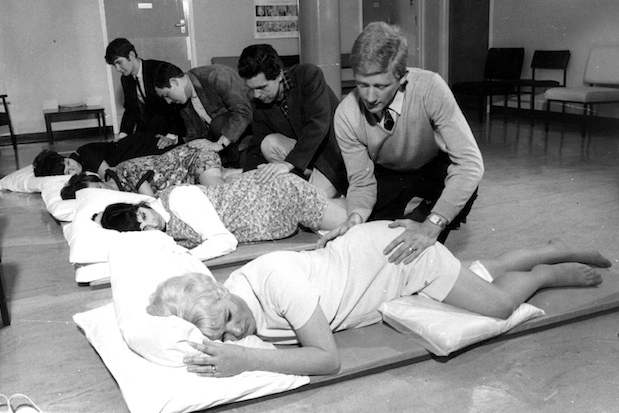I had a slight shock last week, while listening to Desert Island Discs. The admirable nurse Dame Claire Bertschinger had chosen a reading of Rudyard Kipling’s ‘If’ as one of her eight discs. The poem, beautifully read by Michael Caine, was nearing its climax when it came to an abrupt stop. If you do this and that and the other, what…? Nothing. The final stanza, with its punch-line (‘Yours is the Earth and everything that’s in it/And — which is more — you’ll be a Man, my son!’) had been lopped off. I quite see that the poem may be too long to read in its entirety, but it would have been easy to skip the penultimate stanza. Whoever removed the last lines must be illiterate. Or could it be that he or she feared that airing Kipling’s words might offend the sensibilities of the more gender-sensitive members of the audience?
My wonderful tennis coach Paul and his wife are having their first baby next month. But they are not on speaking terms (or they weren’t last Wednesday). Why? Because Paul has refused point blank to go to any more National Childbirth Trust pre-natal classes. Here’s why. The first thing he was asked to do was write his name on a piece of paper, alongside his favourite food — but it had to be a food which begins with the same letter as his name. Paul wrote down ‘potato’, adding ‘roasted, with gravy’. The pieces of paper were then handed round among the eight couples present, so that they could all get to know each other. This process took 35 minutes. (The classes last for two hours, from 7.30 p.m. to 9.30 p.m.) Next he was given a little plastic baby and a little plastic pelvis to play with, so that he could discover the best way to manoeuvre the baby through the pelvis (during this activity, which went on for 40 minutes, the men were taken into a separate room). Then he was required to massage his wife’s back for five minutes — with the lights turned off. Another task was to gaze for a long time at various pieces of A3 paper with illustrations showing small shifts in the baby’s position as it emerges from the womb. Finally the men had to write down four romantic things to give their wives during labour. Paul wrote ‘headgear, in case she hits me’. He endured two of these classes — heroic.
A friend of mine, who teaches English at a girls’ secondary school, has just returned from taking a group of 14-year-olds on a school trip to Ypres. They are studying Wilfred Owen and other first world war poets. First they visited the Flanders Field Museum and were duly impressed by the photos and videos of soldiers struggling and suffering in the trenches. Then they were taken on a tour of the battlefields themselves. At this point an unfortunate incident took place. One of the girls slipped and fell, spattering her brand new turquoise jeans with Flanders mud. The girl reacted by bursting into tears. ‘This trip is crap!’ she cried. Her friends were sympathetic. The girl spent the rest of the day sulking. My first reaction on hearing this story was that it was yet more proof that we are living in a horribly narcissistic age. Hadn’t this girl just been looking at photographs of people terrified of being blown to bits, who were covered from head to toe with mud? Where was her sense of dulce et decorum? But on second thoughts, perhaps this was a knee-jerk reaction on my part. Most girls of 14, in whatever era, would surely care passionately about their new clothes. It doesn’t necessarily mean that they can’t simultaneously feel empathy with the sufferings of others. And aren’t many school trips crap anyway?
Adverbs seem to be going out of fashion, at any rate among sports people. ‘She jumped fantastic’, ‘He’s doing terrific’, ‘It went perfect’ are all phrases I’ve recently heard in interviews with footballers, athletes, tennis players and other sporting celebrities. Since these stars are role models for millions of young people, adverbs may soon be completely vanquished by adjectives. Does it matter?
Always read through your emails before pressing the send button. Not just because everyone makes more mistakes than they think they do, but because, even when you don’t, your computer may make embarrassing gaffes on your behalf. The other day a friend emailed to ask me to phone her as soon as possible. ‘I’ll call you back in a mo,’ I replied. The email she received read: ‘I’ll call you back in a month’. Luckily it was a good friend. Not long ago I emailed someone about a biography of Peter Rachman, the notorious slum landlord who played a minor role in the Profumo affair — I was pointing out that according to this book, Rachman was really quite nice. Back came the reply: ‘I don’t understand why you are writing to me about Rachmaninov.’






Comments